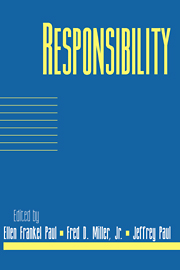Book contents
- Frontmatter
- Contents
- Introduction
- Acknowledgments
- Contributors
- Causation and Responsibility
- Negligence
- Responsibility and Consent: The Libertarian's Problems with Freedom of Contract
- The Irrelevance of Responsibility
- On Responsibility in Science and Law
- Responsibility and the Abuse Excuse
- Why Citizens Should Vote: A Causal Responsibility Approach
- Institutionally Divided Moral Responsibility
- Fate, Fatalism, and Agency in Stoicism
- Ultimate Responsibility and Dumb Luck
- Taking Responsibility for Our Emotions
- Index
Responsibility and the Abuse Excuse
Published online by Cambridge University Press: 06 January 2010
- Frontmatter
- Contents
- Introduction
- Acknowledgments
- Contributors
- Causation and Responsibility
- Negligence
- Responsibility and Consent: The Libertarian's Problems with Freedom of Contract
- The Irrelevance of Responsibility
- On Responsibility in Science and Law
- Responsibility and the Abuse Excuse
- Why Citizens Should Vote: A Causal Responsibility Approach
- Institutionally Divided Moral Responsibility
- Fate, Fatalism, and Agency in Stoicism
- Ultimate Responsibility and Dumb Luck
- Taking Responsibility for Our Emotions
- Index
Summary
introduction
Does a woman's being repeatedly battered by her husband excuse her killing him while he was asleep? This and similar questions are often dealt with by asking a more general question, “Should we accept abuse excuses?” These questions engender a lot of heat, but little light, in the media and other public forums, and even in the writings of many theorists. They have been discussed as if there is a typical abuse excuse we can examine in order to examine abuse excuses in general. Similarly, the question of whether we should accept abuse excuses has often been discussed as if it is simple and straightforward. But there is no one typical abuse excuse, and the question of whether to accept such excuses is neither simple nor straightforward. There are many different abuse excuses, many different circumstances in which they are deployed, and many different sorts of concerns motivating their use. In this, abuse excuses are just like other, well-accepted excuses, such as self-defense.
Nonetheless, the whole category of abuse excuses is often discussed, and rejected, in terms of one or a few abuse excuses. These are often particularly silly or egregious examples–often with dire consequences sure to follow if they are accepted. This combination is used to “show” that no abuse excuses should be accepted.
- Type
- Chapter
- Information
- Responsibility , pp. 175 - 200Publisher: Cambridge University PressPrint publication year: 1999
- 2
- Cited by



